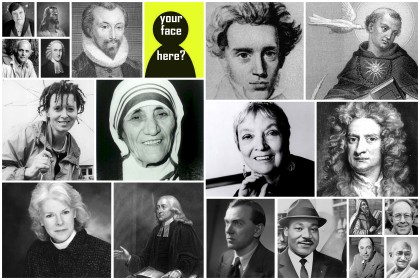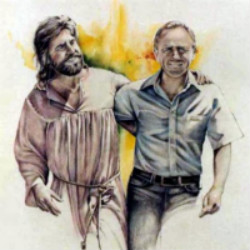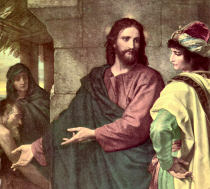
-13-10-2021-
Twenty-Eighth Sunday in Ordinary Time
Gospel: Mark 10:17-30 vs.17 Jesus was setting out on a journey when a man ran up, knelt before him and put this question to him,
vs.17 Jesus was setting out on a journey when a man ran up, knelt before him and put this question to him,
“Good master, what must I do to inherit eternal life?”
v 18 Jesus said to him,
“Why do you call me good? No one is good but God alone.
vs.19 You know the commandments:
You must not kill; you must not commit adultery; you must not steal; you must not bring false witness; you must not defraud; honour your father and mother.”
vs.20 And he said to him,
“Master, I have kept all these from my earliest days.”
vs.21 Jesus looked steadily at him and loved him, and he said,
“There is one thing you lack. Go and sell everything you own and give the money to the poor, and you will have treasure in heaven; then come, follow me.”
vs.22 But his face fell at these words and he went away sad, for he was a man of great wealth.
vs.23 Jesus looked round and said to his disciples,
“How hard it is for those who have riches to enter the kingdom of God!”
vs.24 The disciples were astounded by these words, but Jesus insisted,
“My children,” he said to them “how hard it is to enter the kingdom of God!
vs.25 It is easier for a camel to pass through the eye of a needle than for a rich man to enter the kingdom of God.”
vs.26 They were more astonished than ever.
“In that case“ they said to one another “who can be saved?”
vs.27 Jesus gazed at them.
“For men” he said “it is impossible, but not for God;
because everything is possible for God.”
*******************************************
We have four commentators available from whom you may wish to choose
Michel DeVerteuil : Holy Ghost Priest, director of a Lectio Centre of Biblical renewal .
Thomas O’Loughlin: Prof of Hist. Theology University of Nottingham NG7 2RD
Sean Goan:Studied scripture in Rome, Jerusalem and Chicago
Donal Neary SJ: Editor of The Sacred Heart Messenger and National Director of The Apostlship of Prayer.
****************************************
Michel DeVerteuil
Lectio Divina with the Sunday Gospels
www.columba.ie
Textual Comments
This passage, like last Sunday’s, is in two clearly distinct sections:
– verses 17 to 22: the story of Jesus and the wealthy man;
– verses 23 to 27: a teaching of Jesus on wealth, although the phrase “he looked around” invites us to read this second section as a commentary on what happened in the first section.
Be creative in interpreting the words “inherit eternal life” as entering into a deeper kind of life through prayer and the following of Jesus, but also through deep relationships with other people, or involvement with some noble cause.
 The wealthy man is the model of the one who wants to enter into this deeper life the easy way, by drawing up a list of commandments – things to do and things to avoid – but eventually learns that the only way is to take the risk of leaving all and following one’s Lord. Feel the pathos of the ending of verse 22, remembering those who live with regrets for not having taken the risk at a certain point in their lives.
The wealthy man is the model of the one who wants to enter into this deeper life the easy way, by drawing up a list of commandments – things to do and things to avoid – but eventually learns that the only way is to take the risk of leaving all and following one’s Lord. Feel the pathos of the ending of verse 22, remembering those who live with regrets for not having taken the risk at a certain point in their lives.
Jesus is the teacher, the leader or spiritual guide who is humble but firm and invites the man to make the leap of faith, not coldly or objectively, but himself getting emotionally involved with the man and taking the risk of rejection.
The wealthy man can be for you a model of a community as well as a person; a nation, perhaps, or our modern civilization. Jesus can be a model of a great national leader or of the Church as a whole.
Enter into the teaching on wealth as a journey,
the first statement causing consternation,
the second even more, and the third more still.
Focus on the disciples, remembering when you understood for the first time how you had let yourself be influenced by the false values of the world; or then focus on Jesus, free in himself and his vision clear, so that he can stand by his values in the face of any opposition. Note however his gentleness and compassion even as he makes demands on others.
Scriptural Prayer
Lord, we thank you for the deep relationships we have entered into through your grace
*with one of our children,
*a spouse,
*an intimate friend,
*a leader – the kind of relationship that has given a new quality to our lives.
People sometimes think they can run and kneel before someone and s ay
ay
“You are a good person; what must I do to have a deep relationship with you?”
But as we know, it cannot happen like that;
it isn’t a matter of someone being good,
because only God is good;
not of learning off by heart a list of things to do.
Something is still lacking:
to experience that someone is looking deep into our souls and loving us,
to feel that we could sell everything we own and distribute the money to the poor,
because nothing in the whole world is more important than being with that person.
Of course, many people’s faces fall at this point, because they have things which they cannot let go of, and so they go away sad, with a sadness that nothing will ever cure.
“If a man has not discovered something that he will die for, he isn’t fit to live.” …Martin Luther King
Lord, how many people go away sad because they have never left everything to follow a noble cause.
A modern poet once said, “Traveller, there is no path: paths are made by walking.”
Lord, forgive us that we use the commandments as an excuse for not stepping out in faith.
Lord, help those of us who have authority in the Church to be more like Jesus.
When people run up and kneel before us asking what they must do to inherit eternal life, we let our authority go to our heads;
we rattle off a list of commandments that Christians have learnt from their earliest years, when, like Jesus, we should invite them simply to walk with us.
But that requires an inner freedom on our part, because the faces of some will fall when they hear our words, especially those who have great wealth.
Lord, we thank you for the spiritual journey you have led us on.
When we first began to follow Jesus seriously we were anxious to acquire many virtues.
Then, one day, quite suddenly, we realised how self-righteous we had become:
* we found ourselves condemning others;
* we heard a sermon on humility which touched us;
* someone we had thought of as a sinner appeared to us as deeply spiritual.
It was as if Jesus had looked round at us and said to us,
“How hard it is for those who have riches to enter the kingdom of God!”
It was an insight that astounded us and it took us several weeks to accept it.
Lord, we thank you that you insisted.
Lord, when we see the pitfalls in the way of true holiness,
and how even the virtuous find it difficult to enter there,
we wonder, can anyone be saved.
But that is a moment of grace because we understand then that spiritual growth is your work, and everything is possible for you.
Lord, some nations in the world today have become very wealthy;
no nation in history was ever as wealthy as they are.
Yet their very wealth makes it impossible for them to become caring and sharing communities,
and they go away sad because they cannot give up their present lifestyle.
We thank you that our Pope Francis and many other religious leadershave watched carefully what is happening there,
and have turned round to warn us of the dangers of making economic growth our primary goal.
Many are astounded because their own deepest aspiration is to become wealthy nations in their turn;
but our leaders must insist that it is easier for a camel to pass through the eye of a needle
than for a wealthy nation to enter your kingdom.
Not that it is not possible – because all things are possible to you.
*************************************
Thomas O’Loughlin
Liturgical Resources for the Year of Matthew
www.columba.ie
Introduction to the Celebration
The Spirit living within each of us has gathered us together here. Now the Spirit unites us in Jesus Christ, and in union with him we are here to offer our praise and petition to our Father in heaven. Let us reflect on the mystery of the Spirit moving us towards Jesus. Let us reflect on the mystery of being united in Christ, forming on earth his holy body. Let us reflect on the mystery that we are about to offer thanks to the Father through sharing in the sacred banquet.
Homily Notes
 1. The sadness of the rich young man who goes away from Jesus is something that every one of us should be able to identify with to some extent. We know what it would take build the kingdom of God, to pursue holiness, and to create a culture of love – but it just seems too much. There are too many other commitments, so many urgent things to be seen to first, too much disruption to break the patterns of a lifetime, and the fear that one might just be thought a nutter! To take discipleship really seriously – when most people in our society think that religion is just a private affair for the ‘religious‘, and indeed there will be several in our own families and immediate circle who take a similar view – seems just a little too ‘over the top.’
1. The sadness of the rich young man who goes away from Jesus is something that every one of us should be able to identify with to some extent. We know what it would take build the kingdom of God, to pursue holiness, and to create a culture of love – but it just seems too much. There are too many other commitments, so many urgent things to be seen to first, too much disruption to break the patterns of a lifetime, and the fear that one might just be thought a nutter! To take discipleship really seriously – when most people in our society think that religion is just a private affair for the ‘religious‘, and indeed there will be several in our own families and immediate circle who take a similar view – seems just a little too ‘over the top.’
2. Yet it can be done, has been done, is being done! and will again and again.
3. We can only have the energy, the strength, the joy to follow the path of discipleship if we ask the Father in prayer. For us alone, it is impossible to live as disciples; but if we ask for the Father’s gifts of strength, and energy, and joy, then it is possible ‘because everything is possible for God’.
4. Instead of going away sorrowful, we are called to stay and pray for the help we need to be disciples.
5. This ‘help,‘ this ‘strength,’ this ‘energy,’ this ‘joy‘ is what in traditional western jargon has been given the name ‘grace‘ -but using that word is not helpful in preaching: it is religious jargon that has become so debased through controversy that it obscures more than it reveals to the average listener. So avoid the term ‘grace‘ and use a series of words with a common meaning in its place.
6. This need for the Spirit’s help and presence if we are to follow Jesus’ path to the Father points out three other important truths:
First, the life that the young man could not follow is not something that can be partitioned off from the rest of life: it is not something that is for a special group of devotees such as nuns or monks; nor for just one or two aspects of life. Everyone is called to set out on this journey, what it involves is different for each of us. What is common is that it involves every aspect of our lives: every part of our lives can contribute to the kingdom, and every aspect can contribute to its frustration.
Second, following Jesus is not simply taking on a philosophy of life or picking a particular path towards self-improvement. It is the opposite of the lifestyle guides found under the heading of ‘body-mind-spirit’ in an airport bookshop. To set out on the pilgrimage of faith is to establish a relationship with God and with others. This life is impossible without the gifts of God’s help, strength, energy, and joy that come within this relationship of prayer by which we respond to the invitation to follow Jesus.
Third, we tend to think of prayer as only a ‘private‘ thing – indeed, some people abandon fasting and prayer saying they would rather do something ‘positive‘ for others. This idea fails to appreciate our situation as human beings. The rich young man could not bring himself to care for the poor, and most of us today find it just as difficult. In order to serve other humans, we need to ask the Father for his help and strength, far from removing us from concern for others, opens us up to God and God’s energy opens us up to others.
7. This gospel’s message is not an easy one. We have to accept our weaknesses and we have to turn towards the Father in prayer, and then embrace change with his strengthening help. We can make a fresh start in a few moments in the Prayer of the Faithful.
**********************************
Sean Goan
Let the reader understand
www.columba.ie
Gospel
The demands of discipleship and the need to deny oneself in order to become a servant or a slave have already been mentioned in this part of Mark’s gospel. Now in this story we are presented with a drama that puts flesh on that teaching. A rich man approaches Jesus to ask what must he do to inherit eternal life. He is given the basic answer which requires that he keep the commandments. However, as a practising Jew this is something he would already have known and clearly he is aware that something is still lacking in his life.
Jesus senses his hunger and puts a radical challenge to him. He must rid himself of the attachment to wealth, wherein lies his security and social status, and trust himself completely to God by following Jesus. The man becomes sad and the onlookers are shocked as Jesus states that wealth is an obstacle to the true reception of the kingdom.

For them wealth was considered a sign of divine favour but Jesus insists that it is a barrier and this is because the ideal of love — the driving force of the kingdom — goes beyond the keeping of commandments and demands that we empty ourselves of our attachments in order to become the servant of others. This is not just for the chosen few but part and parcel of the Christian vocation. Clearly we are not all asked to become St Francis of Assisi but we should be careful not to skip over this passage as though it were not intended for us. The challenge of detachment is one for every follower of Jesus.
Reflection
Since the Second Vatican Council Catholics have been called upon to read and pray the scriptures for, as St Jerome said, ‘Ignorance of the scriptures is ignorance of Christ.‘ Thankfully many have responded to this call and have found their faith life enriched beyond measure and have discovered that the word of God is indeed alive and active. Sadly for many others the Bible is still a closed book. Let us pray for and work towards that day when all Catholics will feel at home taking up their Bible in order to deepen their relationship with the living God.
******************
Donal Neary SJ
Gospel Reflections for Sundays of Year B
www.messenger.ie/bookshop.
Real Riches
The preacher had placed a mirror at the end of the church. He asked everyone to look in it and at the edge of the mirror was written, ‘this is your greatest treasure’. The rich man in the gospel thought treasure was in wealth, and this made him sad. The wisdom of Jesus is that wealth not the final happiness. Our biggest treasure is inside ourselves – each of us made in the image of God, by love and for love.
Does our culture today value the dignity of each person and the treasure that each person is? It’s good to have a good house – but sad that it takes up so much energy and expense. Does our hospital care for the elderly and many others value the dignity and the treasure that each person is? Can we go into A & E and say all these people are treasures or just trolley holders? We still have schools and buildings which are substandard for our children.
In any parish the best gift of God to the parish is its people, like in a school or any institution which gathers people together. The rush of life and a general self-centredness can take the focus off the essential in communities and in people. The gospel today asks us to look in the right place for our true wealth and riches – in our giving of time and self to others in the sort of relationships of love which value the worth and dignity of all.
I picture people I know and give thanks to God for each of them
Let your face shine on us O Lord,
that we may see your reflection in each other.